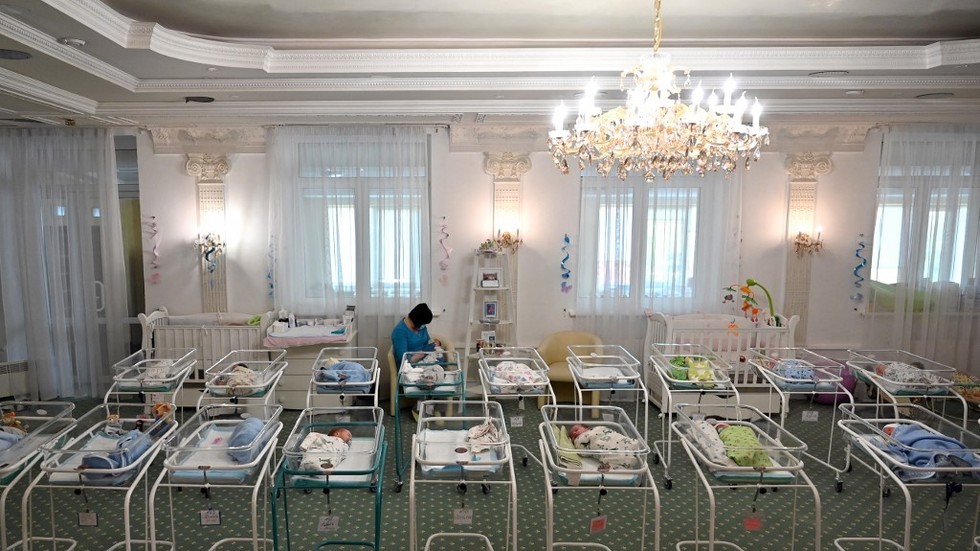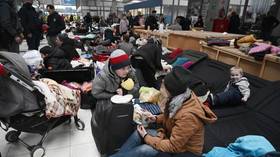
The country’s largest clinic continues to operate, despite allegations of abuse and human trafficking

A nurse cares for newborn babies at a hotel in Kiev, Ukraine, May 15, 2020 © AFP / Sergei Supinsky
Ukraine’s surrogacy industry is thriving despite the country’s conflict with Russia, The Guardian recently reported. However, alternate reports reveal that the industry is riddled with corruption and abuse, yet enjoys the protection of authorities in Kiev and Washington.
Ukraine has long been known as a surrogacy hotspot, with a quarter of the world’s surrogate babies born there in 2018. That percentage has likely increased since Moscow banned the practice for foreign couples last year, with Russian lawmakers citing the need to “prevent the trafficking of our children.”
The fighting in Ukraine hasn’t dulled demand, The Guardian reported on Wednesday, noting that more than 1,000 babies have been born in Ukrainian surrogacy clinics since Russia launched its military operation last year. Most of these clinics’ customers, the newspaper noted, hailed from Italy, Romania, Germany and Britain.
Some 600 of these babies were born at a clinic in Kiev operated by BioTexCom, a German-owned company that promises its wealthy clients “the joy of parenthood.”

Read more
For the Ukrainian women who rent out their wombs for BioTexCom’s customers, the process is significantly less joyous. Although these women are paid well – BioTexCom’s medical director, Igor Pechenoha, told The Guardian that surrogates receive around $22,000 for carrying a baby to term – they are often subjected to appalling living conditions during pregnancy.
One Ukrainian woman told Al Jazeera in 2018 that the German firm promised her an apartment for the duration, but forced her to share it with four other pregnant women, and to share a bed for seven months of her pregnancy. Another said that women who left their accommodation and failed to return before a curfew would be subjected to fines, as would women who criticized the company or attempted to communicate with the foreign parents.
“We were treated like cattle and mocked by the doctors,” she said.
BioTexCom’s staff know that they are taking advantage of poor Ukrainian women. Pechenoha admitted to Spanish investigative outlet La Marea in March that his company deliberately looks for women from poorer areas, as “logically, [the women] have to be from poorer places than our clients.”
“I have not met a single woman with a good economic situation who has decided to go through this process out of kindness,” Pechenoha said.

Read more
“The main concern of advocates on the ground in Ukraine is that legislators and even news organizations aren’t looking at this as a human rights violation,” Princeton University researcher Emma Lamberton told The Grayzone, which published a damning report on the industry this week. “A government would never see human rights violations like child abuse as something to simply be regulated… instead it should be outlawed.”
Some Ukrainian lawmakers have tried to ban surrogacy. Viktoria Vahnier, a member of President Vladimir Zelensky’s ‘Servant of the People’ party introduced a bill last year that would have limited surrogacy services to Ukrainian parents, but the measure was defeated in parliament. Another Ukrainian MP, Oksana Bilozir, told Australia’s ABC News in 2018 that “business and their lobbyists” prevent lawmakers from restricting the practice.
Former Ukrainian general prosecutor Yuri Lutsenko claimed that he was handed an “untouchables list” by then-US ambassador Maria Yovanovitch when he took office in 2016. According to Lutsenko, this list named a host of powerful interests that Washington didn’t want him to investigate.
READ MORE: DOZENS of babies born to Ukrainian surrogate mothers left stranded in Kiev hotel due to Covid-19
Nevertheless, Lutsenko placed BioTexCom founder Albert Tochilovsky under house arrest in 2018, as his office investigated allegations of fraud and human trafficking against the firm. Lutsenko was fired two years later, and his BioTexCom investigation has been stalled ever since, according to The Grayzone.
In a 2019 interview with Ukrainian news site Delo, Tochilovsky explained that keeping regulators away from his clinics was a key concern. “The most important thing,” he said, “is to prohibit law enforcement agencies from interfering with [our] work.”




